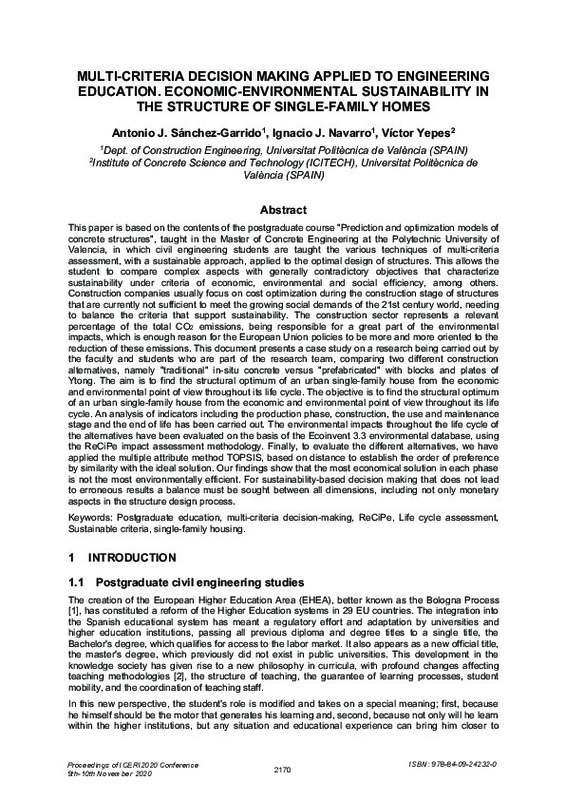JavaScript is disabled for your browser. Some features of this site may not work without it.
Buscar en RiuNet
Listar
Mi cuenta
Estadísticas
Ayuda RiuNet
Admin. UPV
Multi-criteria decision making applied to engineering education. Economic-environmental sustainability in the structure of single-family homes
Mostrar el registro sencillo del ítem
Ficheros en el ítem
| dc.contributor.author | Sánchez-Garrido, Antonio J.
|
es_ES |
| dc.contributor.author | Navarro, Ignacio J.
|
es_ES |
| dc.contributor.author | Yepes, V.
|
es_ES |
| dc.date.accessioned | 2021-12-20T08:39:18Z | |
| dc.date.available | 2021-12-20T08:39:18Z | |
| dc.date.issued | 2020-11-10 | es_ES |
| dc.identifier.isbn | 978-84-09-24232-0 | es_ES |
| dc.identifier.uri | http://hdl.handle.net/10251/178565 | |
| dc.description.abstract | [EN] This paper is based on the contents of the postgraduate course "Prediction and optimization models of concrete structures", taught in the Master of Concrete Engineering at the Polytechnic University of Valencia, in which civil engineering students are taught the various techniques of multi-criteria assessment, with a sustainable approach, applied to the optimal design of structures. This allows the student to compare complex aspects with generally contradictory objectives that characterize sustainability under criteria of economic, environmental and social efficiency, among others. Construction companies usually focus on cost optimization during the construction stage of structures that are currently not sufficient to meet the growing social demands of the 21st century world, needing to balance the criteria that support sustainability. The construction sector represents a relevant percentage of the total CO2 emissions, being responsible for a great part of the environmental impacts, which is enough reason for the European Union policies to be more and more oriented to the reduction of these emissions. This document presents a case study on a research being carried out by the faculty and students who are part of the research team, comparing two different construction alternatives, namely "traditional" in-situ concrete versus "prefabricated" with blocks and plates of Ytong. The aim is to find the structural optimum of an urban single-family house from the economic and environmental point of view throughout its life cycle. The objective is to find the structural optimum of an urban single-family house from the economic and environmental point of view throughout its life cycle. An analysis of indicators including the production phase, construction, the use and maintenance stage and the end of life has been carried out. The environmental impacts throughout the life cycle of the alternatives have been evaluated on the basis of the Ecoinvent 3.3 environmental database, using the ReCiPe impact assessment methodology. Finally, to evaluate the different alternatives, we have applied the multiple attribute method TOPSIS, based on distance to establish the order of preference by similarity with the ideal solution. Our findings show that the most economical solution in each phase is not the most environmentally efficient. For sustainability-based decision making that does not lead to erroneous results a balance must be sought between all dimensions, including not only monetary aspects in the structure design process. | es_ES |
| dc.description.sponsorship | The authors acknowledge the support received from the Ministry of Economy and Business and the FEDER funding (Research Project BIA2017-85098-R). | es_ES |
| dc.language | Inglés | es_ES |
| dc.publisher | IATED Academy | es_ES |
| dc.relation.ispartof | ICERI2020 Proceedings | es_ES |
| dc.rights | Reserva de todos los derechos | es_ES |
| dc.subject | Postgraduate education | es_ES |
| dc.subject | Multi-criteria decision-making | es_ES |
| dc.subject | ReCiPe | es_ES |
| dc.subject | Life cycle assessment | es_ES |
| dc.subject | Sustainable criteria | es_ES |
| dc.subject | Single-family housing | es_ES |
| dc.subject.classification | INGENIERIA DE LA CONSTRUCCION | es_ES |
| dc.title | Multi-criteria decision making applied to engineering education. Economic-environmental sustainability in the structure of single-family homes | es_ES |
| dc.type | Comunicación en congreso | es_ES |
| dc.type | Capítulo de libro | es_ES |
| dc.identifier.doi | 10.21125/iceri.2020.0521 | es_ES |
| dc.relation.projectID | info:eu-repo/grantAgreement/AEI/Plan Estatal de Investigación Científica y Técnica y de Innovación 2013-2016/BIA2017-85098-R/ES/DISEÑO Y MANTENIMIENTO OPTIMO ROBUSTO Y BASADO EN FIABILIDAD DE PUENTES E INFRAESTRUCTURAS VIARIAS DE ALTA EFICIENCIA SOCIAL Y MEDIOAMBIENTAL BAJO PRESUPUESTOS RESTRICTIVOS/ | es_ES |
| dc.rights.accessRights | Abierto | es_ES |
| dc.contributor.affiliation | Universitat Politècnica de València. Departamento de Ingeniería de la Construcción y de Proyectos de Ingeniería Civil - Departament d'Enginyeria de la Construcció i de Projectes d'Enginyeria Civil | es_ES |
| dc.contributor.affiliation | Universitat Politècnica de València. Instituto de Ciencia y Tecnología del Hormigón - Institut de Ciència i Tecnologia del Formigó | es_ES |
| dc.description.bibliographicCitation | Sánchez-Garrido, AJ.; Navarro, IJ.; Yepes, V. (2020). Multi-criteria decision making applied to engineering education. Economic-environmental sustainability in the structure of single-family homes. IATED Academy. 2170-2180. https://doi.org/10.21125/iceri.2020.0521 | es_ES |
| dc.description.accrualMethod | S | es_ES |
| dc.relation.conferencename | 13th International Conference of Education, Research and Innovation (ICERI 2020) | es_ES |
| dc.relation.conferencedate | Noviembre 09-10,2020 | es_ES |
| dc.relation.conferenceplace | Online | es_ES |
| dc.relation.publisherversion | https://doi.org/10.21125/iceri.2020.0521 | es_ES |
| dc.description.upvformatpinicio | 2170 | es_ES |
| dc.description.upvformatpfin | 2180 | es_ES |
| dc.type.version | info:eu-repo/semantics/publishedVersion | es_ES |
| dc.relation.pasarela | S\422144 | es_ES |
| dc.contributor.funder | Agencia Estatal de Investigación | es_ES |








